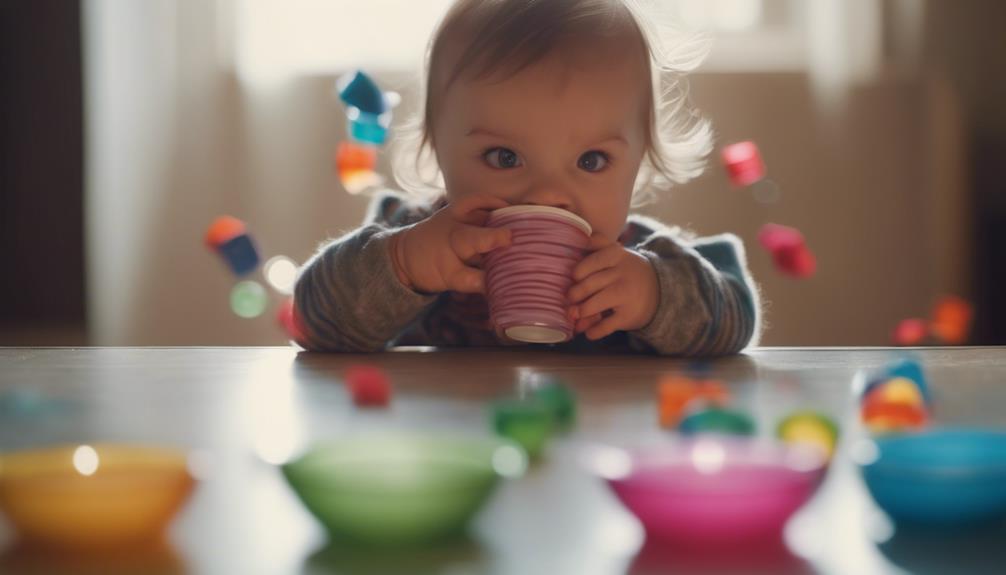To successfully care for a baby, it is important to focus on skin-to-skin contact to bond, regulate their heartbeat, and maintain their temperature. Create a safe environment by baby-proofing, installing safety gates, and securing furniture. Stick to feeding schedules every 2-3 hours, keep track of diaper changes, and establish calming bedtime routines. Provide sensory stimulation, use toys appropriate for their age, and encourage interactive play for their development. Practice responsive caregiving by promptly addressing your baby’s needs. Seek guidance from healthcare professionals for care, feeding, and developmental milestones, ensuring regular check-ups. Encourage communication by using simple words, reading aloud, and responding to their babbling. For more tips on raising a baby, check out additional information on essential advice for new parents.
Key Takeaways
- Bond through skin-to-skin contact for bonding and development.
- Establish feeding and sleeping routines for a healthy schedule.
- Engage in sensory play to stimulate development and learning.
- Provide responsive caregiving for emotional security and attachment.
- Seek healthcare support for guidance and monitoring of the baby's health and development.
Bonding Through Skin-To-Skin Contact
To bond with your baby effectively, engage in skin-to-skin contact from the very beginning. This practice not only regulates your newborn baby's heartbeat and stabilizes their temperature but also aids in weight gain. Additionally, it can improve your baby's sleep patterns and overall sleep quality.
According to research, skin-to-skin contact releases oxytocin, a hormone that promotes bonding and reduces stress for both you and your baby. Furthermore, this physical closeness enhances breastfeeding success by stimulating your baby's feeding instincts and increasing milk production in mothers.
Experts emphasize the importance of skin-to-skin contact for the cognitive development, emotional well-being, and overall growth of infants. Dr. Smith, a renowned pediatrician, states, 'The benefits of skin-to-skin contact are immense, from fostering a strong bond between parent and baby to supporting successful breastfeeding.'
Hence, make it a priority to incorporate regular skin-to-skin contact into your daily routine to establish a strong connection with your newborn and promote their well-being.
Establishing Safe and Stimulating Environment

When setting up your baby's environment, it's important to prioritize safety by removing potential hazards like small objects and ensuring secure furniture and outlets.
Additionally, creating a stimulating space with colorful toys and engaging activities can aid in your baby's development and learning process.
Baby-Proofing Your Home
Ensure your home is a safe and stimulating environment for your baby by implementing proper baby-proofing measures. Install safety gates at the top and bottom of staircases to prevent falls and accidents. Make sure to block off hazardous areas such as the kitchen or bathroom. Secure furniture to walls using anchors to avoid tipping over and potentially injuring your baby. Cover electrical outlets with safety plugs to prevent any accidental shocks. Remember to keep small objects, choking hazards, and toxic substances out of reach by storing them in locked cabinets or high shelves.
Baby-proofing your home is vital to guarantee your baby's safety and well-being. According to the American Academy of Pediatrics, 'Accidents are the leading cause of death in children,' so taking these preventive measures is essential. By creating a safe environment, you allow your baby to explore and play freely without unnecessary risks.
Stay vigilant and continuously assess your home for any potential hazards that may need addressing.
Providing Sensory Stimulation
Create a safe and engaging environment for your baby by incorporating various sensory experiences such as soft textures, gentle sounds, and contrasting colors. Use age-appropriate toys like rattles, textured balls, and musical mobiles to engage your baby's senses.
It's vital to rotate these toys and introduce new sensory stimuli regularly to prevent overstimulation and promote cognitive development. Encourage tactile exploration by providing safe objects such as fabric squares, plastic keys, and teething toys for your baby to touch and explore.
Activities like tummy time, gentle massages, and interactive play are great ways to stimulate your baby's senses and support their overall development. Remember, interactive play is important for your baby's sensory stimulation and learning.
As pediatrician Dr. Smith recommends, 'Interactive play helps babies learn about their environment and develop important skills.' So, make sure to create a sensory-rich environment to help your baby thrive.
Setting Feeding and Sleeping Routines

To guarantee your baby thrives, establishing a feeding routine is key. Feed your little one every 2-3 hours to meet their nutritional needs.
Additionally, creating a soothing bedtime routine can help signal it's time to sleep.
Feeding Schedule Basics
Establishing a feeding routine based on your baby's hunger cues is vital for setting feeding and sleeping routines in the early weeks. By feeding your baby 8-12 times a day, you can guarantee they're getting enough nourishment to support their growth and development. Monitoring milk intake is essential, so keep an eye on wet diapers (aim for 6-8 a day) and weight gain to track their progress. Following the recommended guidelines for breastfeeding or formula feeding will help you provide the right amount of nutrition in small, frequent doses.
When it comes to sleep habits, newborns need around 16-17 hours of sleep per day, including naps throughout the day and night. Establishing a calming bedtime routine can help signal to your baby that it's time to sleep, promoting better sleep habits in the long run.
Sleep Routine Strategies
Developing a consistent bedtime routine is crucial for establishing feeding and sleeping routines that promote healthy sleep habits for your baby. To establish a successful sleep routine, begin by creating a calming bedtime ritual. This could involve activities like a warm bath, a gentle massage, or reading a bedtime story to signal to your baby that it's time to wind down for sleep.
Avoid stimulating activities close to bedtime and aim to create a peaceful environment to help your baby relax before sleep. Additionally, make sure your baby is well-fed during the day with regular feeding sessions every 2-3 hours to reduce the likelihood of frequent wake-ups at night.
Introduce a bedtime routine that includes feeding, changing into pajamas, dimming lights, and engaging in soothing activities to prepare your baby for a restful night's sleep. By being patient and consistent with the bedtime routine, you can assist your baby in developing healthy sleep patterns and associating bedtime with relaxation and rest.
Encouraging Sensory Experiences and Play

Engage your baby in various sensory experiences to stimulate their senses and promote healthy development. By providing opportunities for sensory exploration, such as touching different textures, listening to soothing sounds, and looking at contrasting colors, you can support their sensory development.
Offer age-appropriate toys like soft rattles, textured balls, and colorful mobiles to encourage exploration and stimulate their senses further.
Encouraging interactive play is also vital. Singing songs, playing peekaboo, and using hand gestures can enhance your baby's cognitive skills and promote social interaction.
Creating a safe and stimulating environment with soft play mats, sensory toys, and interactive books will support their sensory development as well.
Remember to rotate toys and activities regularly to keep your baby engaged and interested in exploring different sensory experiences. This variety is essential for promoting their overall development and ensuring they continue to benefit from sensory stimulation.
Responsive Caregiving Practices

Responsive caregiving practices are essential for building a strong bond and promoting healthy development in your baby. By taking the time to understand and promptly respond to your baby's needs, you provide a sense of security and trust that's critical for their well-being.
Helping your baby feel safe and comforted through responsive caregiving practices plays an important role in their emotional regulation and overall development. Responding to your baby's cues not only strengthens the parent-child attachment but also aids in getting to know their individual communication style.
As you engage in responsive caregiving practices, remember that consistency is key. By being attuned to your baby's signals and promptly meeting their needs, you're laying the foundation for a healthy and secure relationship.
In the words of child development expert, Dr. Karen DeBord, 'Responsive caregiving is about being there for your baby when they need you most. It's a way of showing them that they can rely on you for comfort and support.'
Seeking Support From Healthcare Professionals

Accessing support from healthcare professionals is essential for managing the various aspects of caring for your baby. Healthcare providers play an important role in guiding you through the challenges of parenthood. Here are some reasons why seeking support from healthcare professionals is crucial:
- Healthcare professionals can provide valuable advice on newborn care, feeding techniques, and tracking developmental milestones.
- Regular check-ups with healthcare providers are essential to monitor your baby's health and growth progress accurately.
- Healthcare professionals offer support for parents dealing with postpartum challenges and emotional well-being, ensuring you and your baby are well taken care of.
- Seeking advice from healthcare professionals can help address concerns about your baby's sleep patterns and feeding schedules, providing you with peace of mind.
- Healthcare providers can recommend helpful resources and support groups for parents managing the early stages of parenthood, offering additional assistance and guidance.
Creating Interactive Play Opportunities

To enhance your baby's cognitive development and strengthen your bond, incorporate interactive play opportunities into your daily routine. Interactive play is a powerful tool that stimulates your baby's mind, fostering creativity and problem-solving skills. Engaging in play activities not only entertains your little one but also deepens the connection between you and your child. By playing together, you create memorable moments that contribute to a strong parent-child relationship.
These play-based activities aren't just fun; they also provide valuable sensory experiences for your baby. Simple games like peek-a-boo or playing with textured toys can captivate your baby's attention and enhance their motor skills. These interactions help in developing social skills, emotional intelligence, and even lay the foundation for future language development.
Incorporating interactive play into your daily routine is essential for your baby's overall growth and development. So, make sure to set aside dedicated time for play and exploration with your little one.
Communication and Language Development

Engage in interactive conversations with your baby to foster their language development effectively. This crucial step in communication and language development involves more than just talking to your infant. It includes using simple words and gestures, reading aloud to enhance vocabulary and listening skills, encouraging babbling, and responding to your baby's attempts at communication.
Singing songs, reciting nursery rhymes, and playing language-related games are also excellent ways to stimulate linguistic growth. By engaging in interactive conversations and activities with your baby, you provide them with a rich language environment that supports their language development journey.
- Use simple words and gestures to communicate effectively with your infant.
- Read aloud to your baby to enhance vocabulary and listening skills.
- Encourage babbling and respond to your baby's attempts at communication.
- Sing songs, recite nursery rhymes, and play games that involve language to stimulate linguistic growth.
Ensuring Baby's Sense of Security

Creating a sense of security for your baby is vital for their overall well-being and development. Make sure to provide consistent routines and schedules to establish predictability and comfort.
Swaddling your baby can help recreate the snug feeling of the womb, promoting a sense of safety. Respond promptly to your baby's cues and maintain eye contact to build trust and strengthen your bond.
Creating a peaceful environment with soft lighting, gentle sounds, and familiar scents can also help your baby feel secure. Remember, physical closeness is essential for fostering attachment and security.
Cuddling, skin-to-skin contact, and babywearing can all contribute to your baby's sense of well-being. As one expert suggests, 'Rocking your baby gently can mimic the soothing sensation of being in the womb, providing comfort and security.'
Frequently Asked Questions
What Advice Would You Give to the Parents of a New Baby?
For new parents, prioritize bonding through skin-to-skin contact and establish routines for feeding and sleeping. Seek support from healthcare providers and cherish milestones with your baby. Trust your instincts and embrace the journey ahead.
What Is the Hardest Week With a Newborn?
The hardest week with a newborn is typically around the second week after birth. You may face heightened exhaustion, emotional challenges, unpredictable sleep patterns, and frequent feeding needs. Seek support to cope during this overwhelming time.
What Do New Moms Struggle With the Most?
You struggle with sleep deprivation from night feedings. Balancing self-care and a newborn overwhelms you. Postpartum challenges like anxiety and feeling isolated are tough. Adjusting to a new routine leaves you with little personal time.
What Is the Hardest Month of the Baby's First Year?
Getting through the first year with your baby can feel like riding a rollercoaster. The hardest month is often the ninth when separation anxiety peaks, making it tough for you to step away even for a moment.
Conclusion
To sum up, raising a baby is a rewarding yet challenging experience that requires dedication and patience. By following the essential tips outlined in this article, you can create a safe and stimulating environment for your little one to thrive.
Remember, as the saying goes, 'It takes a village to raise a child,' so don't hesitate to seek support from healthcare professionals and loved ones as you navigate this new journey of parenthood. Your efforts will surely pay off in the long run.










